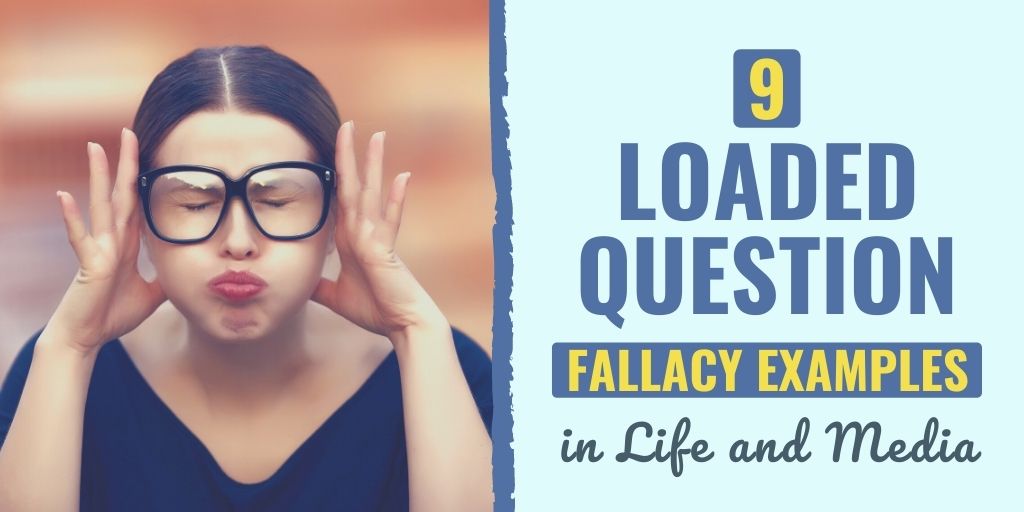We all make assumptions.
Making assumptions is a way to save brain power, as we can simply put patterns together of human behavior or other phenomena based on our past experiences. Doing so helps us make sense of the world as we encounter new people or situations.
And while making assumptions isn’t always a bad thing, doing so can be problematic when you’re interacting with others.
Has anyone ever asked you a question in a way that immediately put you on the defense because it made you look like a bad person, regardless of whether the answer was yes or no?
If so, you were asked a loaded question. This common tactic is often used in debates or as a rhetorical tool in politics to trip people up in a way that causes them to falsely agree to an assumption that someone is making.
While loaded questions are not always asked intentionally, it’s important to know how to spot them in order to prevent misunderstandings or misconceptions that can be implied from conversations that contain them.
In this article, we will define a loaded question fallacy and then look at 9 examples of when you could come across these questions in your daily life. After reading this article, you will be equipped with the knowledge to be “one up” on the next person who tries to trip you up by using a loaded question.
Let’s get started by looking at the definition of a loaded question.
What Is a Loaded Question?
A loaded question is a type of logical fallacy in which the interrogator uses flawed logic to pose a question based on an implicit assumption. Often, especially in debates, the assumption being made is controversial or notably untrue. These questions are often inflammatory in nature, making them an effective way to derail an otherwise rational debate, as the recipient may be quick to become defensive.
The defining factor of these questions is the implicit assumption about the respondent that is included in the question.
Loaded questions are controversial because they capitalize on the human weakness to immediately react to an emotional response without much consideration. When someone suggests that you believe or behave in a way that is not true, you’ll probably want to quickly correct them–especially if you feel like they’re being accusatory.
Loaded questions help people gain control by tricking others into implying something about themselves that isn’t true–and often unfavorable. We will look at how this can be used maliciously later on, but for now, let’s look at an example that you’re probably familiar with.
Think of the last time you were on the receiving end of a relentless salesperson’s pitch. They may ask, “Do you want to pay with cash or credit?” This dichotomous question presumes that you’re planning to make a purchase, so if you answer it directly, you may find yourself to be the proud owner of a new mistake.
It’s important to know a loaded question when you see one. Often used rhetorically, these questions aren’t intended to elicit a truthful answer. Rather, the interrogator is usually aiming to manipulate a response to gain control over the dialogue.
In this article, we will look at 9 examples of loaded questions that will help you understand why they are problematic. We will also take a look at how you can properly respond to this type of question, and how you can avoid the fault of using them yourself.
Let’s get started by looking at some specific examples.
9 Examples of Loaded Questions
1. “Have you stopped mistreating your children?”
This example shows how loaded questions can be phrased in an accusatory way that pressures the person being asked to answer in a manner that confirms a harmful assumption. This question makes the presupposition that the person being questioned has, in fact, mistreated their children in the past, and it’s posed in a way that elicits two possible responses:
- No, I have not stopped mistreating my children.
- Yes, I used to mistreat my children, but have since stopped.
No matter if the respondent chooses to say yes or no, he or she will look like they’re agreeing with the presupposition that child abuse had once occurred. And while this is being stated as a question to evoke information, it really implicates the other person to be a child abuser. Regardless of whether or not that’s true, listeners have now associated this person with cruelty toward children in some way.
Assuming that the respondent has never mistreated their children, their instinct could lead them to reply with either yes or no, which would ostensibly confirm their opponent’s accusation. Such a reply can be instinctual because of the dichotomous nature of the question, and because both answers can make sense if the person has never mistreated their children in the first place. One may intuitively reply “yes” in an attempt to say they aren’t mistreating their children, or “no” if they are trying to communicate they’ve never mistreated their children before. However, without further explanation, neither answer denies past abuse.
2. “Are you actually voting for this corrupt politician?”
This loaded question is worded in an attempt to force someone to agree with one’s own views that a politician is, in fact, corrupt. It suggests that the right answer is to say no, because if the respondent says yes, it means that they are inadvertently agreeing that the politician is corrupt, yet they’re still voting for the candidate.
This is a manipulative attempt to limit the potential replies to only those that would serve the agenda of the person asking the question.
3. “How many mass shootings will it take until the government changes gun laws?”
While this question isn’t necessarily inflammatory toward the recipient, it makes a presupposition that making stricter gun laws is the solution to decreasing the number of mass shootings. Whether or not this is the case, it is a claim that implies a firm truth that the person who is being asked may or may not agree with.

However, when one hears a question such as this, they’ll instinctively try to answer it directly, which means the asker has successfully distracted the person from potentially rejecting the claim that gun laws are the primary or only cause of mass shootings. Even though using this tactic in this case is clever, it is still fallacious.
4. “We have heard that a half million children have died. I mean, that is more children than died in Hiroshima. And, you know, is the price worth it?”
This is a real-life example of a loaded question that was asked to Madeleine Albright in 1996 on CBS’s 60 Minutes. Although she later recanted her response, Albright initially fell into this question’s trap. The question posed was regarding the impacts of the United Nations’ sanctions against Iraq at the time.
Rather than questioning the unattributed claim that half a million children had died, or how much of this death toll was directly related to the sanctions, Albright replied by saying, “I think that is a very hard choice, but the price, we think, the price is worth it.”
Albright later made a statement, claiming she should have answered the question by pointing out the flaws in its premise and reframing it to be more representative of the facts. She claimed she realized this as soon as she had spoken, and referred to her reply as being a terrible mistake, further noting that she, “had fallen into a trap and said something that [she] simply did not mean.”
This example shows how powerful loaded questions can be, both for the person who is on the receiving end and the audience listening.
5. “Can you tell the country, sir, why you are content with all the fanfare around the steel to leave the conscience of this nation–the strength of this nation–unaccounted for in relation to these four Americans?”
This is another real-life example of a loaded question that was posed to president Obama regarding issues occurring with Iran involving four Americans who were being held there against their will at that time.
The journalist posing this question made the presupposition that President Obama was, in fact, content with having citizens being held captive, making this a loaded question.
In this case, Obama spotted the logical fallacy and pointed it out to the journalist. He then rephrased the question to be more accurate and answered his own version of the question, but not before scolding the journalist for trying to manipulate the interview.
6. “Have you always been an alcoholic?”
Like the others, this question attempts to limit the potential responses strictly to those that serve the questioner's agenda, which in this case is saying the other person is an alcoholic:
As you can see, regardless of whether the answer to the question is yes or no, it implicates that the person who is being asked is, in fact, an alcoholic.

7. “Are you sure you want to hire an entitled millennial?”
By answering this question directly, the person being asked is agreeing with the sweeping generalization that millennials feel entitled. Loaded questions are often used to exploit stereotypes such as this to influence the interlocutor's decisions.
When trying to influence someone’s decision, asking a loaded question can prompt the other person to second guess themselves, especially if they’re unaware of a stereotype. What’s more, studies have found that we often take the opinions and responses of our peers into account when making our own decisions, even if we feel that our peers are mistaken. This means that people can be persuaded after being asked a loaded question if the person asking is a trusted friend.
In this case, the question may modify a person’s decision to hire a particular candidate by associating them with laziness and a sense of entitlement simply due to his or her age. The question may also influence their decision because the loaded question is worded in a way that is clearly seeking “no” for a response, and people who are risk-averse wouldn’t want to take the chance of being blamed if the candidate they hired wasn’t ideal.
8. “Can you just admit for once that you’re unwilling to see another person’s perspective?”
Think about the possible answers to this question:
Like the possible to answers to other loaded questions, both options implicate something damaging about the person who is being questioned that can hurt their reputation. And while the respondent is free to reject the premise of the question, it’s posed in a way that prompts them to answer it with a confirmation statement, even if this isn’t what they would typically do.
9. “Is Christianity the only true religion?”
A loaded question can only be considered to be as such if the implication being made (which, in this example, is that Christianity is true) is not a verified fact. Because not everyone agrees in the Christian faith, and “faith” by definition is backed by beliefs rather than facts, this question is loaded.

Whether the respondent says yes or no, they’re agreeing that Christianity is true. And, if this question is asked to a non-Christian, they’re likely to take a defensive stance.
Because of this, the setting is an important factor in this example. If this question is asked to a Christian pastor, it may be a genuine question, as the asker likely assumes the pastor believes in Christianity. However, this question becomes less innocent if it’s asked to a co-worker in the break room.
How to Respond to Loaded Questions
Because loaded questions are phrased in a way that attempts to make the recipient agree with something that they may disagree with, if you find yourself on the receiving end of one, you need to know how to stand your ground.
First, consider whether the person who asked the question understands what they just did and why it’s a problem. Doing this may impact how you choose to respond, depending on whether or not the question was posed in such a way on purpose or it was a genuine mistake.
You may refuse to answer the question, however, you will still run the risk of losing credibility if you don’t handle the situation well because you may become associated with the issue at hand.
So, rather than answering the question as it was asked, you have to challenge the assumption that was built into the question. For example, you could say something like, “Your question can’t be answered directly because it contains an incorrect assumption that I have any children.”
Or, you can ask the other person to rephrase the question in a way that “unloads” it.
If you believe that doing this will make it appear to others that you’re trying to dodge the question, be prepared to explain the loaded question fallacy.
How to Avoid Asking Loaded Questions
Bias can inadvertently sneak up without us even realizing it. Everyone has their own opinions, and even if we try to avoid it, these can leak out in our conversations.
To avoid asking loaded questions to other people, you have to be aware of your tendency to make assumptions that the other person may disagree with. If you need to, break your question down into a series of smaller questions to make sure the other person is on the same page. If they’re not, your follow up questions can be posed appropriately.
Be aware of some commonly loaded words that are overcharged with emotion or words that imply some sort of bias and avoid using them. Also avoid speaking in absolutes and tone down any strong verbs and adjectives that can influence other people’s thoughts.
Learn About Other Logical Fallacies
- 5 Appeal to Nature Fallacy Examples in Media and Life
- 6 Outcome Bias Examples That Can Negatively Impact Your Decisions
- 7 Self-Serving Bias Examples You See Throughout Life
- 7 Omission Bias Examples That Negatively Impact Your Life
- 6 Authority Bias Examples That Might Impact Your Decisions
- 5 Burden of Proof Fallacy Examples
- 5 Appeal to Tradition Fallacy Examples in Life
- 5 Appeal to Authority Logical Fallacy Examples
- 7 False Cause Fallacy Examples
- 7 Appeal to Ignorance Fallacy Examples
- 7 Appeal to Common Sense Logical Fallacy Examples
- 5 Post Hoc Fallacy Examples (and How to Respond to This Argument)
- Gambler’s Fallacy: 5 Examples and How to Avoid It
- 5 Appeal to Anger Fallacy Examples Throughout Life
- 7 Halo Effect Bias Examples in Your Daily Life
- 7 Poisoning the Well Examples Throughout Your Life
- 7 Survivorship Bias Examples You See in the Real World
- 7 Dunning Kruger Effect Examples in Your Life
- 7 Either Or (“False Dilemma”) Fallacy Examples in Real Life
- 5 Cui Bono Fallacy Examples to Find Out “Who Will Benefit”
- 6 Anchoring Bias Examples That Impact Your Decisions
- 7 Virtue Signaling Examples in Everyday Life
- 7 Cherry Picking Fallacy Examples for When People Ignore Evidence
- 9 Circular Reasoning Examples (or “Begging the Question”) in Everyday Life
- 9 Appeal to Emotion Logical Fallacy Examples
- 9 Appeal to Pity Fallacy (“Ad Misericordiam”) Examples in Everyday Life
- 9 Confirmation Bias Fallacy Examples In Everyday Life
- 9 Bandwagon Fallacy Examples to Prevent Poor Decisions
- 5 Red Herring Fallacy Examples to Fight Irrelevant Information
- 9 Middle Ground Fallacy Examples to Spot During an Argument
- 5 False Equivalence Examples to Know Before Your Next Argument
- 7 Hasty Generalization Fallacy Examples & How to Respond to Them
- 6 Straw Man Fallacy Examples & How You Can Respond
- 6 False Dichotomy Examples & How to Counter Them
- 7 Slippery Slope Fallacy Examples (And How to Counter Them)
- What is the Planning Fallacy?
- How to Overcome the “Sunk Cost Fallacy” Mindset
Final Thoughts on Loaded Questions
Whether they’re asked by mistake or with the intention of incriminating someone in some way, loaded questions can be problematic in clear and truthful communication. Hopefully after reading this guide you feel confident in being able to spot loaded questions and comfortable with how you can respond if someone asks you one.
Finally, if you want a simple process to counter the logical fallacies and cognitive biases you encounter in life, then follow this 7-step process to develop the critical thinking skills habit.

Connie Mathers is a professional editor and freelance writer. She holds a Bachelor's Degree in Marketing and a Master’s Degree in Social Work. When she is not writing, Connie is either spending time with her daughter and two dogs, running, or working at her full-time job as a social worker in Richmond, VA.


